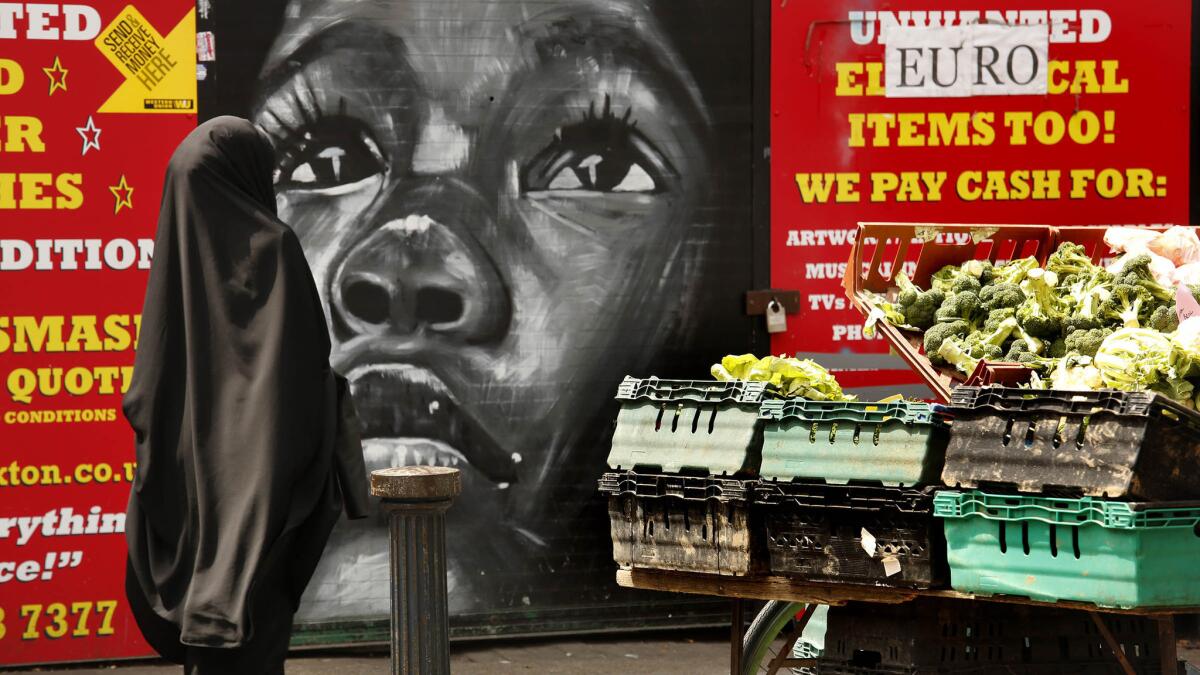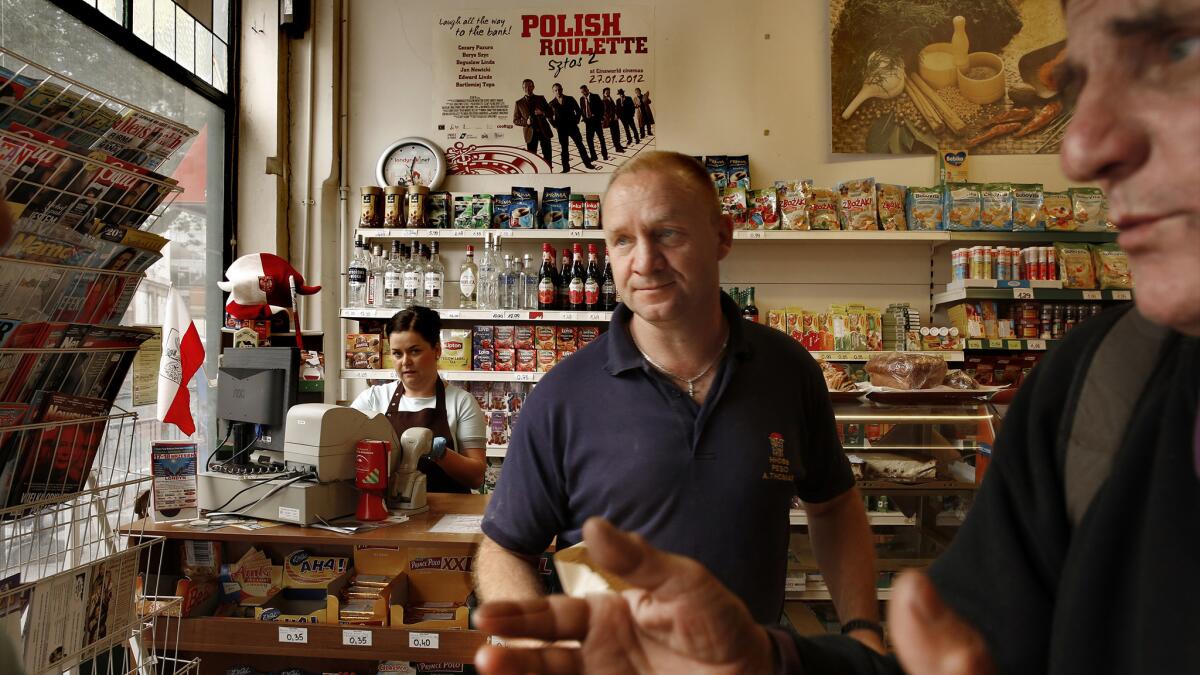Graffiti at a Polish center in London sends a clear message: Some ‘Brexit’ supporters want immigrants out

Reporting from London — When staff members arrived to open the Polish Social and Cultural Assn. community center, an institution in immigrant-rich West London for five decades, they were greeted by an ugly message.
A vulgarity was painted on the doors in big yellow letters, along with the word “Out.”
The insult, found Sunday morning, had been washed off by early Monday and a contingent of security guards stood watch.
But to many in London’s large Polish community, the graffiti crystallized a swirling anti-immigrant sentiment that they fear has been unleashed with Britain’s historic vote last week to leave the European Union.
“It’s very unsettling,” said Joanna Mludzinska, the association’s chairwoman. “People are worried that they are going to be made to feel unwelcome here, or that it’s OK for bigots to say such things.”
The vandalism was one of a rash of incidents in the days since the referendum Thursday that many residents say has exposed the simmering anger over immigration and ripped open a long-standing cultural divide over what it means to be British.
Londoners, in fact, voted overwhelmingly to remain in the EU. The nation’s overall result, however, gave the “Leave” campaign 52% of the vote.
In Cambridgeshire, north of London, local media reported that cards reading “Leave the EU” and “No more Polish vermin” were found outside elementary schools hours after the results were announced.

Much of the abuse has been directed at Poles and other Eastern European immigrants who flocked to Britain in greater numbers over the last decade after their countries were admitted into the EU, which was created after World War II to generate economic cooperation and avoid war. Membership in the multi-nation partnership gave the immigrants the right to leave behind economies struggling to rise from the rubble of the Iron Curtain to chase opportunity in what was seen as a land of prosperity.
The recent hostility has also targeted people of South Asian origin and other ethnic minority groups, heightening tensions in a country already riven by political uncertainty.
The Muslim Council of Britain, the country’s largest Muslim organization, said it had logged more than 100 “hate incidents” from social media posts and other sources since the referendum results were announced Friday showing that Leave voters had outpolled “Remain” supporters. The group said Muslims and others had been taunted with racial slurs and cries of “Go home!”
While London’s Muslim mayor, Sadiq Khan, called on police to be “extra vigilant” against hate crimes, Prime Minister David Cameron called what happened at the Polish center “despicable” and denounced the reports of verbal attacks against minorities.
Brexit updates: What’s happening now that Britain voted to leave the EU »
“Let’s remember these people have come here and made a wonderful contribution to our country,” Cameron told lawmakers Monday. “We will not stand for hate crimes or these kinds of attacks.”
Leaders of the campaign to exit the EU stoked beliefs that if Britain quit what had been a 28-nation bloc, it would end a tide of immigration that had robbed residents of jobs and overburdened the healthcare and entitlement systems.
Nigel Farage, head of the far-right UK Independence Party, said he would prefer to admit immigrants who were “more likely to speak English, understand common law and have a connection with this country.”
Such remarks were widely interpreted as a slam against people from Poland, who number about 800,000 in the nation, making them one of the largest minority groups in a country of 65 million.
Independent studies have consistently rejected the argument that EU immigrants are a drain on the system.
Through 2011, immigrants from Central and Eastern European countries contributed 12% more in taxes than they received in benefits, according to a 2014 study by University College London’s Center for Research and Analysis of Migration.

The London School of Economics found this year that EU immigration had not harmed the wages or job prospects of workers born in Britain.
“We are a scapegoat because we are so visible,” Adriana Chodakowska, editor of the London-based Polish news site londynek.net, said in her corner office on an upper floor of the community center, which also houses a Polish cafe, bookstore and several other businesses.
“London is actually a very Polish place. So when politicians like Mr. Farage talk about European citizens, he means the Polish people.”
After Polish fighter pilots played a key role in defending Britain from German bomber attacks in World War II, a large community of Poles settled in West London, establishing the cultural center in 1967. A much greater wave of migration began in 2004, when the EU opened membership to several former Eastern Bloc countries, including Poland.

Over the next two years, Britain invited more than a quarter of a million Polish workers into the country, where they took difficult, often low-wage jobs in construction and other fields that many people saw as undesirable. The “Polish plumber” became a national icon of reliability and industriousness — although in recent years, more educated Poles have begun to fill jobs in finance and medicine.
Ola Modzelewska was fresh out of college when she left Poland two decades ago to settle in London. She spoke no English but got by waiting tables and cleaning houses, eventually starting her own business — a driving school — before moving on to a successful consulting career.
Now she is considering leaving Britain because of the referendum result and what she sees as growing xenophobia.
On Monday, she and a Greek co-worker began filling out applications for jobs at EU headquarters in Brussels.
“I’m afraid about what is going to happen,” she said. “The rhetoric is so upsetting. I have never taken a penny from the government. We are all working ... and paying taxes. So to hear ‘those migrants are stealing our jobs,’ that is horribly unfair and unfounded.”
The reports of vandalism and verbal attacks have also confirmed her fears that despite the city’s outward appearance of ethnic and linguistic diversity, many Londoners harbored suspicions about foreigners.
“I always thought this was a xenophobic place, but I feel it much more now,” Modzelewska said. “I would open my mouth to speak to someone, and my English is pretty good now, but sometimes you would see a bad reaction, like they didn’t understand your accent. They were just trying to make a point — that you’re not a native speaker.”
Brexit updates: What’s happening now that Britain voted to leave the EU »
Anti-immigrant sentiment has been building for years, at least since the 2008 financial crash. Polish groups accused the Daily Mail, the country’s most popular tabloid, of exacerbating tensions with stories about Polish immigrants squeezing money from the government.
In 2013, police made 585 arrests for hate crimes against Polish people, according to a report in the Guardian newspaper.
Cameron, who campaigned to stay in the EU and has announced he will resign as prime minister later this year, also stoked controversy with a plan to withhold public housing and employment benefits from European immigrants for five years. The plan was dismissed by opponents of EU membership as insufficient.
Some Poles who have lived long enough in Britain to gain citizenship said they believed the argument that the recent wave of Eastern and Central European immigrants was taxing the system.
“There are people who come here and don’t pay taxes and cheat,” said interior designer Eva Wojciechowski, 39, who supported leaving the EU.
“We have our own country,” she said, sipping coffee near the community center on a block also lined with Iranian, Indian and Chinese restaurants. “There is a limit to how many people can be supported here.”
Follow @SBengali on Twitter for more news from South Asia
MORE BREXIT NEWS
‘Brexit’ could halt the growth of California trade with Britain
Horsey: ‘Brexit’ diminishes Britain and threatens European security
‘Brexit’ fallout: On financial services, Britain snatched defeat from the jaws of victory
Britain voted to leave Europe, but how quickly will it pull the trigger?
More to Read
Sign up for Essential California
The most important California stories and recommendations in your inbox every morning.
You may occasionally receive promotional content from the Los Angeles Times.











